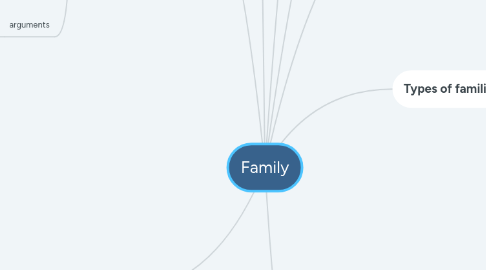
1. Celebrations and Ceremonies
1.1. baptism
1.2. confirmation ceremony - birmovka
1.3. birthdays
1.4. Christmas, Easter...
1.5. prom and graduation ceremony
1.6. weddings
1.7. funerals
1.8. What are important celebrations in your family?
2. Problems
2.1. lack of communication
2.2. arguments, quarrels, nagging...
2.3. divorce
2.4. generation gap
2.4.1. interference - e.g. parents
2.4.2. may often results in fights, arguments, quarrels
2.4.3. solutions
2.4.3.1. effective communication
2.4.3.2. showing mutual respect
2.4.3.3. setting healthy boundaries
2.4.3.4. etc.
2.5. gender stereotypes
2.5.1. taking care of the household, household chores
2.5.2. income - "who brings home the bacon" = earns a living
2.5.3. maternity leave vs. paternity leave
2.5.4. more examples...
2.6. domestic violence, alcoholism, abuse, drugs...
2.7. infidelity
2.8. arguments
2.8.1. being untidy
2.8.2. drinking alcohol
2.8.2.1. wasting money
2.8.3. staying out / up late
2.8.4. schoolwork and marks
3. Types of families
3.1. nuclear family
3.2. extended family
3.3. foster care / foster family
3.4. adoptive family
3.5. complete family
3.6. single-parent family
3.7. step-family
3.8. in-laws
4. Differences UK v SVK
4.1. UK
4.1.1. moving out at the age of 18 is expected
4.1.2. people relocate frequently
4.1.3. multicultural society....
4.1.4. famillies may not get together very often
4.1.5. greeting cards, postcards....
4.1.6. family meals - dinner
4.1.6.1. Sunday roast
4.1.7. Christmas traditions....
4.2. SVK
4.2.1. moving out is very difficult
4.2.1.1. multi-generational families
4.2.2. people are more religious
4.2.3. large weddings
4.2.4. people tend to stay where they were born
4.2.4.1. young people?
4.2.4.2. brain-drain
4.2.5. family meals - lunch
4.2.6. Christmas traditions...
5. Roles in a family
5.1. parents
5.1.1. household chores, gender stereotypes?
5.2. siblings
5.2.1. elder / younger
5.3. extended family
5.3.1. aunts, uncles, cousins, in-laws...
5.4. grandparents
5.4.1. generation gap?
6. Functions
6.1. reproduction - family is the basic unit of procreation and society
6.2. financial and material security
6.3. emotional support and companionship
6.3.1. social support network
6.3.2. upbringing and education
6.4. forum for resolving conflicts and learning social skills
6.5. identity formation - personal values and what is important in life
7. The Royal Family
7.1. British Royal Family Tree
7.1.1. see here
7.2. Contributions of the Royal family
7.2.1. an economic boost
7.2.1.1. in the 50s...
7.2.2. Commonwealth
7.2.2.1. Canada, Australia, New Zealand, India, South Africa...
7.2.3. charity work, public awarness
7.2.3.1. HIV awarness
7.2.3.2. work for children
7.2.3.3. ecological awarness
7.2.4. representative
7.2.4.1. speech
7.2.4.1.1. Christmas speech
7.2.4.1.2. brithdays, coronations, weddings...
7.2.5. the late Queen Elizabeth II
7.2.5.1. King Charles III
7.2.5.1.1. Prince William
7.2.5.1.2. Prince Harry
7.2.5.1.3. Diana, Princess of Wales
8. Ancestry
8.1. family tree
8.2. your family name - what does it represent?
8.3. family stories _ TV show: Who do you think you are?
8.4. family recipes
8.5. ethnic ancestry
8.6. noble ancestry - House of Lords
8.6.1. nobility, aristocracy
9. Stages of life
9.1. an infant to a toddler
9.1.1. learning to walk
9.1.2. using first words
9.1.3. playing with new toys
9.1.4. being more independent
9.1.5. sensitive to other
9.2. small child to a teenager
9.2.1. starting primary school
9.2.2. learning to travel indepndently
9.2.3. developing interests
9.2.3.1. school clubs
9.2.3.2. sports
9.2.3.3. games
9.2.4. forming important relationships
9.2.4.1. family
9.2.4.2. friends
9.2.4.3. classmates, teachers
9.2.5. having pets
9.2.6. being curious
9.3. from tenns to the twenties
9.3.1. key decisions
9.3.1.1. career choices
9.3.2. leaving home and your family
9.3.3. financial responsibilities
9.3.4. university studies
9.3.5. first job
9.3.6. more serious relationships
9.3.6.1. falling in love
9.3.6.2. finding a partner
9.3.7. interests
9.3.7.1. fashion
9.3.7.2. sports
9.3.7.3. celebrities
9.3.7.4. music
9.3.7.5. social media
9.3.7.6. curiosity, travelling
9.3.8. travelling with friends
9.3.9. awarness of the environment and ecological issues
9.3.10. might be unhappy with their financial situation
9.4. middle age
9.4.1. settling down, starting a family
9.4.2. stable job, stable income
9.4.3. possibly having a change of career
9.4.4. buying a house, a car
9.4.4.1. financial situation..?
9.4.5. marriage - "tying the knot"
9.4.6. divorce
9.4.7. taking care of others
9.4.7.1. your children
9.4.7.2. your parents
9.4.7.3. your friends
9.4.8. travelling with your family
9.4.9. judging young people's behaviour
9.4.9.1. a generation gap
9.4.10. awarness of the environment and ecological issues
9.5. an elderly person
9.5.1. retirement
9.5.2. more free time
9.5.3. taking care of your grandchildren
9.5.4. health problems
9.5.5. looking back at your life
9.5.6. attending funerals
